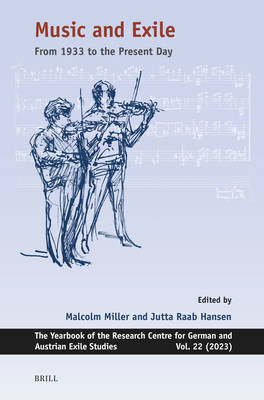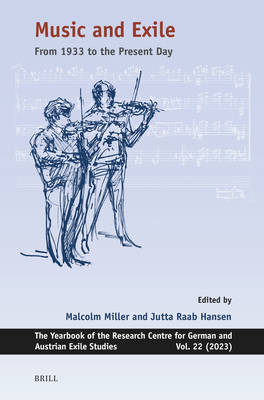
- Afhalen na 1 uur in een winkel met voorraad
- Gratis thuislevering in België vanaf € 30
- Ruim aanbod met 7 miljoen producten
- Afhalen na 1 uur in een winkel met voorraad
- Gratis thuislevering in België vanaf € 30
- Ruim aanbod met 7 miljoen producten
Zoeken
Music and Exile
From 1933 to the Present Day
€ 162,95
+ 325 punten
Omschrijving
How did exiled musicians from Germany and Austria, who reached safety at Kitchener Camp in Britain, find themselves in an Australian internment camp in New South Wales in 1940? What were the institutions that helped Jewish refugee musicians survive in wartime Shanghai? What happened to Austrian musicians who were trapped in the Netherlands after the German occupation?
These and other questions, and the larger stories they refer to, form the compelling content of this book. Other topics include the struggle of the Vienna operetta composers Granichstaedten and Katscher in USA, the relationship of émigré composer Berthold Goldschmidt to his native Hamburg and the reception of his 'exile opera' Beatrice Cenci. Studies of Mischa Spoliansky's music for the movie Mr. Emmanuel(1944) and Franz Reizenstein's radio opera Anna Kraus form part of the fourteen essays on exile musical history in Britain, Europe, USA, Australia and the Far East, based on cutting edge archival research and interviews by leading scholars.
These and other questions, and the larger stories they refer to, form the compelling content of this book. Other topics include the struggle of the Vienna operetta composers Granichstaedten and Katscher in USA, the relationship of émigré composer Berthold Goldschmidt to his native Hamburg and the reception of his 'exile opera' Beatrice Cenci. Studies of Mischa Spoliansky's music for the movie Mr. Emmanuel(1944) and Franz Reizenstein's radio opera Anna Kraus form part of the fourteen essays on exile musical history in Britain, Europe, USA, Australia and the Far East, based on cutting edge archival research and interviews by leading scholars.
Specificaties
Betrokkenen
- Uitgeverij:
Inhoud
- Aantal bladzijden:
- 324
- Taal:
- Engels
- Reeks:
- Reeksnummer:
- nr. 22
Eigenschappen
- Productcode (EAN):
- 9789004540651
- Verschijningsdatum:
- 9/03/2023
- Uitvoering:
- Paperback
- Formaat:
- Trade paperback (VS)
- Afmetingen:
- 156 mm x 234 mm
- Gewicht:
- 358 g

Alleen bij Standaard Boekhandel
+ 325 punten op je klantenkaart van Standaard Boekhandel
Beoordelingen
We publiceren alleen reviews die voldoen aan de voorwaarden voor reviews. Bekijk onze voorwaarden voor reviews.







